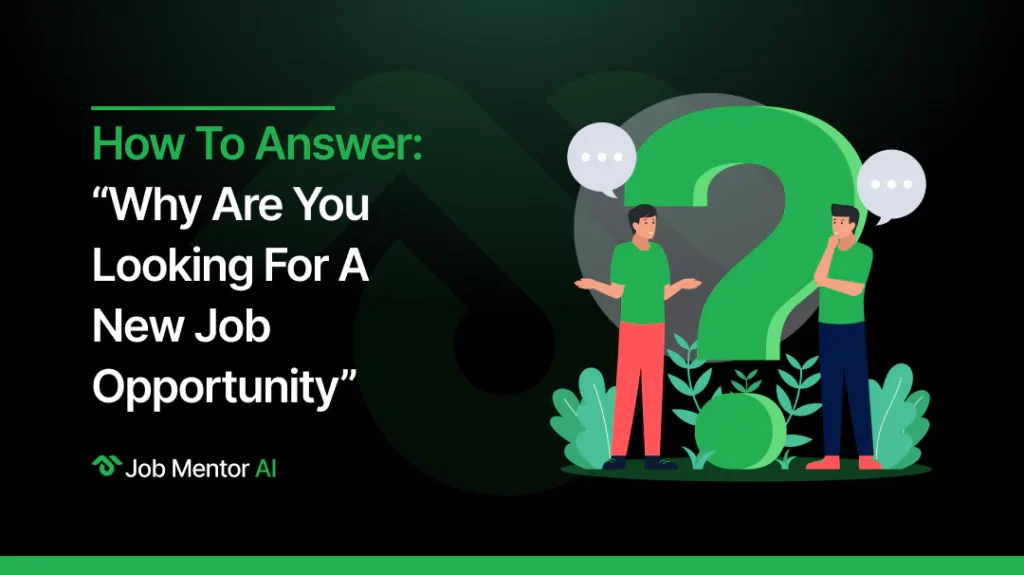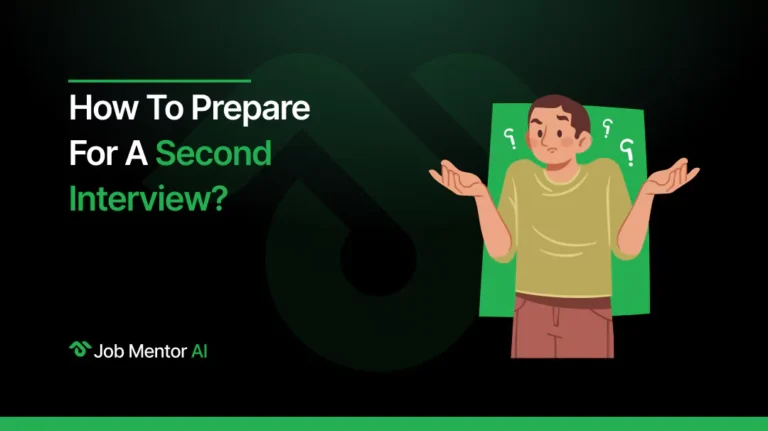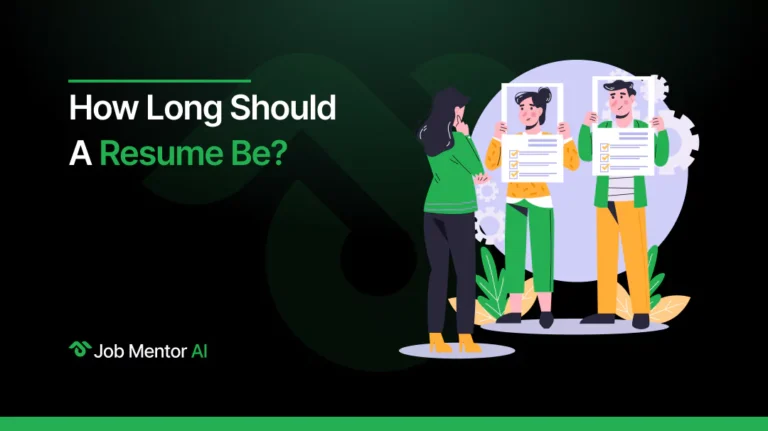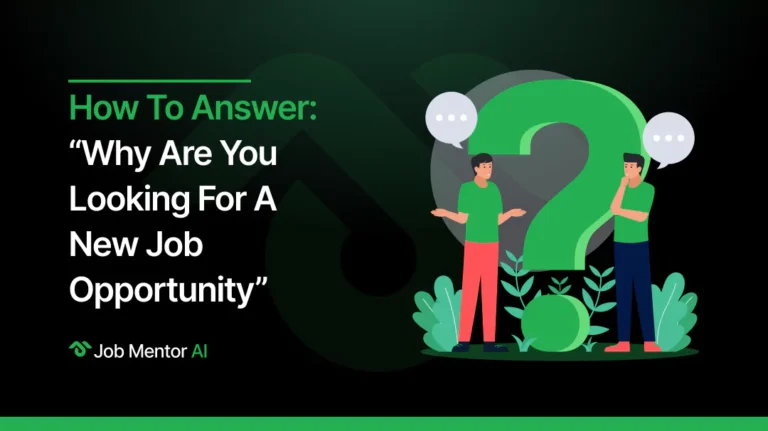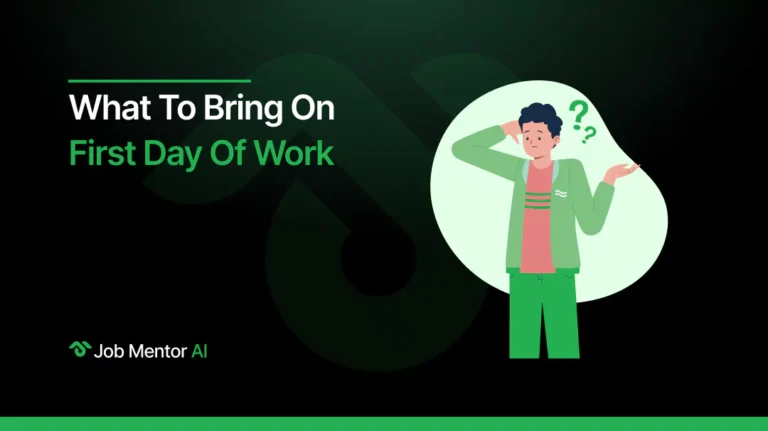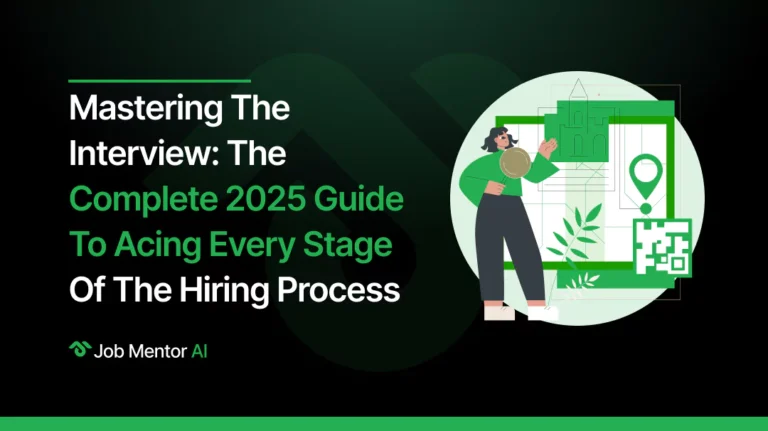When an interviewer asks why you’re exploring a new role, it’s an opportunity to showcase your career goals, motivations, and long-term potential with the company. By answering clearly and positively, you can highlight your readiness for growth, demonstrate your value, and turn this common question into a chance to impress and stand out.
In this blog, we’ll cover why interviewers ask this question, provide proven response structures, share the best ways to frame your answer, and include sample responses for roles like SEO Specialist, Data Analyst, and more. You’ll also find practical interview tips, key takeaways, a conclusion that ties everything together, and a helpful FAQ section to prepare you for follow-up questions.
Why do interviewers ask, “Why Are You Looking for a New Job Opportunity?”
When hiring managers ask questions, they’re not only curious about your situation; they’re evaluating how well you’ll fit into their team and whether your reasons for moving align with what they can offer. Here are the main things they’re trying to uncover:
- Your career motivation: They want to know what drives you, whether it’s growth, new challenges, learning opportunities, or a healthier work environment.
- Clarity of career direction: A clear answer shows that you’ve thought about your professional path and aren’t job-hopping without purpose.
- Fit with the role: Employers check if your reasons for leaving match what their company can provide, ensuring mutual benefit.
- Expectations for the workplace: Your answer reveals the kind of culture, leadership, or flexibility you’re seeking.
- Risk of quick turnover: If your motivations are vague or heavily tied to temporary factors, they may worry you’ll leave again soon.
- Professionalism in communication: They listen to whether you can explain your reasons without complaining about or criticizing your past employer.
- Consistency and honesty: Contradicting yourself or giving an unclear response can raise doubts about your credibility.
- Long-term alignment: Ultimately, they want to see if you’re choosing their role as part of a planned career move, not just as an escape from your current situation.
Best Answers to the Question: “Why Are You Looking for a New Job Opportunity?”
When preparing your response, it’s important to connect your reason for moving on with what the new company offers. Use our AI Interview Answer Generator to reflect on your past roles and create more polished examples tailored to what interviewers are looking for. Below are effective answer types you can adapt to your situation:
1. Career Growth / New Challenges
You can highlight your readiness to step up and take on more responsibility. For example:
“I’ve reached a point where I want to take on larger projects and leadership opportunities. This role provides the scope to challenge myself while contributing to meaningful outcomes.”
2. Skill Development / Learning
Show that you’re motivated by continuous learning. For instance:
“I’m eager to strengthen my skills in areas like data visualization and cloud technologies. I see that this position provides both exposure and mentorship, which is exactly what I’m looking for.”
3. Company Direction / Mission Fit
Employers appreciate candidates who connect with their values. A good response might be:
“I’m drawn to organizations that prioritize sustainability, and your company’s commitment to green innovation aligns with my personal values and career vision.”
4. Relocation / Life Circumstances (brief + factual)
Keep it short and professional without oversharing. Example:
“I recently relocated to this area and I’m looking for a position where I can apply my five years of industry experience to support a local team.”
5. Role Mismatch (positive spin)
Focus on what you gained, then pivot to what you want. For instance:
“My current role gave me great exposure to project coordination, but I’d like to move into a position with more focus on data analysis — which is the core of this opportunity.”
6. Management / Cultural Fit (careful, neutral)
Be professional and avoid negative language. For example:
“I’m looking to join a collaborative environment where open communication and feedback are encouraged. From what I’ve learned, your team values align with that approach.”

Best Response to: “Why Are You Looking for a New Job Opportunity?”
When interviewers ask this question, they want clarity, not a complicated speech. The best way to answer is by following a simple step-by-step flow. This helps you stay positive, structured, and relevant while showing that you’ve thought carefully about your career direction.
Here’s a clear 4-step approach:
1. Start with truth and context
Give a short introduction about your current role and what you have learned. Keep it professional and highlight growth.
“I have spent the last three years at my current company where I developed strong skills in project coordination and communication.”
2. Share your primary reason
Explain why you are ready for the next move. Focus on growth, new challenges, or alignment with your goals.
“I am now looking for an opportunity to take on more responsibility and expand my leadership experience.”
3. Connect your reason to the role
Show why this specific position fits your career path.
“This role is appealing to me because it offers the chance to lead larger projects and contribute to client success.”
4. End with a value statement
Finish by pointing out what you bring that will help the company succeed.
“With my background in process improvement and team collaboration, I can add value by improving workflows and ensuring successful project delivery.”
Example template:
“I’ve grown a lot as a [current role] at [company], but I’m looking for a role where I can [primary reason]. I’m excited about this opportunity because [how this role matches], and I believe my experience in [skill] will help [desired outcome].”
You can make your answer even stronger by referencing the company’s key priorities or showing how the role connects with your learning goals. When preparing for interviews, it also helps to review how to introduce yourself and practice how to impress a hiring manager effectively. Focusing on clarity, confidence, and alignment will help you make a strong impression on any interviewer.
Sample Answer to “Why Are You Looking for a New Job Opportunity?”
Below are seven role-specific examples that show how to explain your career move clearly, positively, and with a focus on future growth. Each answer is around 3-4 sentences, highlighting your experience, motivation, and what you hope to achieve in the new role.
Example 1: SEO Specialist
“I have enjoyed improving organic traffic and on-page optimization at my current company, where I successfully boosted search visibility through technical SEO and content planning. I’m now looking for a role where I can lead strategic SEO initiatives across multiple product lines and collaborate with cross-functional teams. This position’s focus on advanced SEO strategy, content development, and analytics aligns perfectly with my goals, and I believe my experience in driving measurable traffic growth will help achieve strong results for your business.”
Example 2: Data Analyst
“In my current role, I have built a strong foundation in data cleaning, reporting, and dashboard creation. I am eager to move into a position that emphasizes predictive modeling, machine learning, and product analytics to deliver actionable insights. This role’s opportunity to work directly with product teams and translate complex data into strategies for user growth and optimization matches my career ambitions, and I can contribute my expertise in SQL, Python, and data visualization to generate impactful results.”
Example 3: Quality Analyst
“I have honed comprehensive testing processes and implemented automation frameworks in my current company, ensuring high-quality software releases. I am looking to join a team where quality is integrated into the development lifecycle from the start. This role’s focus on test automation, continuous integration, and deployment aligns with my goal to improve efficiency, reduce regression cycles, and enhance product reliability. My experience in developing detailed test cases and collaborating with development teams positions me to contribute immediately to your quality objectives.”
Example 4: Database Engineer
“I have managed and optimized relational databases in a high-traffic environment, focusing on performance tuning, indexing, and query optimization. I am now interested in working on large-scale distributed systems to handle more complex and high-volume data environments. This position emphasizes database scaling, performance monitoring, and cutting-edge architecture, which matches my aspirations. I bring hands-on experience with database optimization, replication strategies, and problem-solving skills that can support your team’s data reliability and efficiency goals.”
Example 5: WordPress Developer
“I have built and maintained WordPress websites for small to medium businesses, creating custom themes, plugins, and optimizing site performance. I am ready to work on enterprise-level projects that involve more complex architecture and headless CMS implementations. This role’s focus on advanced web solutions and scalability fits my career goals, and my technical expertise in PHP, JavaScript, and performance optimization can contribute to faster, more reliable website deployments.”
Example 6: Business Development
“I have successfully generated new business opportunities and managed client relationships in my current market. I am seeking a role that allows for more strategic partner development and expansion into international markets. This position focuses on building long-term enterprise relationships and negotiating complex deals, which aligns with my strengths and career ambitions. My experience in pipeline management, client engagement, and deal structuring equips me to drive measurable business growth for your organization.”
Example 7: Network Administrator
“I have maintained a 24/7 network infrastructure for a mid-sized organization, implementing upgrades and ensuring uninterrupted operations. I am looking for a role that involves larger-scale network security projects and advanced architecture implementation. Your team’s emphasis on modern firewall solutions, zero-trust security models, and network scalability matches my professional goals. I bring experience in monitoring, troubleshooting, and securing network systems that can help strengthen your IT infrastructure and maintain operational continuity.”
Tips for a Successful Interview
- Be concise and focused: Keep your answers clear and to the point. Ideally, each response should last between 45 and 90 seconds, giving enough detail to demonstrate your experience while keeping the interviewer engaged.
- Frame negatives positively: Instead of complaining about a previous role or employer, focus on growth opportunities or learning experiences. For example, explain what you gained from challenges rather than dwelling on frustrations.
- Quantify your accomplishments: Whenever possible, use numbers or measurable outcomes to show your impact. Examples include statements like “improved page load time by 40 percent” or “reduced incident response time by 30 percent,” which make your achievements concrete and memorable.
- Practice both short and expanded answers: Rehearse a concise 2–3 sentence version for quick questions and a slightly longer 45–90 second version for behavioral prompts. This helps you stay confident and flexible during the conversation.
- Match your tone to the company culture: Adapt your style depending on the environment. More conservative industries may expect formal responses, while startups may appreciate a slightly energetic and enthusiastic approach.
- Prepare a brief closing statement: Conclude your answers with a short line that reinforces your interest and fit. For example, “I am excited about this role because it allows me to leverage my experience in X, and I would love to discuss how my skills in Y can contribute to your team’s success.”
- Use strategies to calm nerves and structure answers: Familiarize yourself with techniques for handling stress during interviews and structuring responses to behavioral questions. You can also strengthen your follow-up by sending a well-crafted thank-you emai after an interview to reinforce your interest and fit, helping you leave a strong first impression.

Key Takeaways
- Interviewers ask “Why are you looking for a new job opportunity?” to evaluate motivation, fit, and turnover risk.
- Always answer in a positive, forward-looking way. Mention your past experience, why you want to move on, how the role fits your goals, and what you can contribute.
- Stay professional and avoid speaking negatively about previous employers or focusing only on salary.
- Make your answer relevant to the role and prepare both a short and a longer version to use during the interview.
- For thorough preparation, start with the complete interview guide to cover each hiring stage and pair it with how to impress a hiring manager to refine your answers, presence, and follow-up approach.
Conclusion
Answering “Why are you looking for a new job opportunity?” well gives interviewers a clear snapshot of your career direction, not just why you left, but where you want to go. A short, structured reply links your past experience to your next goals, signals professionalism, and helps interviewers see both your immediate fit and your longer-term potential. Practice this narrative until you can deliver it naturally and confidently, and you’ll turn a tricky question into one of your strongest moments in the interview.
To sharpen your preparation, use an AI Interview Assistant coach to rehearse answers, refine your delivery, and build real confidence before the meeting.
👉 Try AI Interview Intelligence for instant, practical feedback that accelerates improvement and helps you walk into interviews calmer, clearer, and more convincing.
Table of Contents
Frequently Asked Questions
Why should we hire you?
Link your answer to the value you bring. Highlight your skills, achievements, and experience, and show how they match the role’s requirements. You can use measurable examples from past work and conclude by showing enthusiasm for contributing to the company’s success.
How to answer “Why are you looking for a new job?”
Key points to include:
- Briefly state your current experience and accomplishments.
- Explain your reason for seeking a new role (growth, skills, challenges).
- Show alignment with the new position and company culture.
- Highlight the value you can contribute.
- Keep your tone positive and professional.
How to answer “Are you looking for a new opportunity?”
Points to cover:
- Be honest and concise.
- Emphasize your interest in growth and career alignment.
- Mention what motivates your move without criticizing your current job.
- Connect your goals to the responsibilities of the new role.
Is it okay to say I want a higher salary?
Mentioning salary is fine if it’s a factor, but frame it as part of a package: responsibilities, career growth, and compensation rather than the only reason.
How to answer “What are you looking for in your next role?”
Talk about the responsibilities, challenges, or growth opportunities that matter to you. For example, focus on leadership, strategic projects, or skill development. Make sure your answer aligns with the job description and shows you’ve thought carefully about your next career step.

